Gentleman Biaggi
Banned
This is what you've all been waiting for.
Also, thanks to @gap80 for all the help!
A More Perfect Union
The leadership elections in America are quite like the conventions of pre-Parliament America. In it only a certain amount of delegates get to vote on people. While some have attacked it as being undemocratic it has been in place for decades and it is unlikely to end now. Two parties would hold leadership elections due to retirements. The Conservatives and the Progressives. Sanders and McCain had both been serving as party leader since 2004 and had both entered parliament in 1984, and both had been endorsed by their party's leaders at the time, Jerry Brown for Sanders, and Clint Eastwood for McCain. It was an end of an era.
The Conservative campaign would only have three candidates, which was surprising due to older leadership elections with more candidates. The three candidates were Jeb Bush, Jeff Sessions, and Rand Paul. Bush would gain the endorsement of McCain, helping him in polls. Not only that, but his opponents campaigns both had problems, while Bush ran a safer campaign. Sessions had problems since his campaign was trying to gain support from some members of the party that had left to join the the Constitution Party. While Sessions tried to appeal to the more populist wing of the party, he was failing to gain moderate voters, although a few did in protest of Bush’s boring campaign. Meanwhile, Paul had a different problem. While Libertarians had a place in the conservative party since Eastwood’s successful 12 years in office, Paul’s dad, Ron, ran a campaign that many declared radical against McCain in 2008. Paul was making things harder by running to preserve Eastwood’s America, the same campaign that Ron ran on in 2008. Paul picked up more votes than his father, but images of his father hurt his campaign.
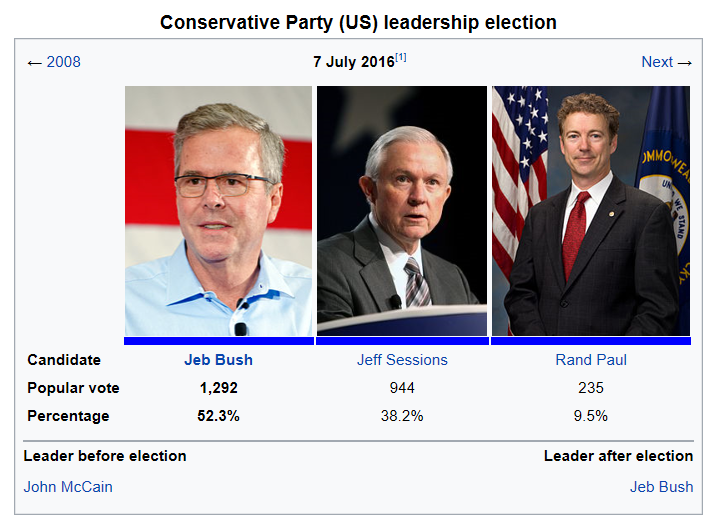
Meanwhile, the Progressive Party was having its leadership election, with more candidates. The election would have five, Elizabeth Warren, Al Franken, Kate Brown, Zephyr Teachout, and Ron Wyden. Warren was seen as the successor to Sanders, although Sanders never endorsed her. Meanwhile, Franken, the former comedian ran a humorous, yet competitive campaign. Wyden ran off his long years of experience in parliament. However, Franken’s campaign wasn’t taken seriously by many and Wyden was seen as too “establishment” for many. Then there was Brown and Teachout. While both ran as populist Progressives, both had problems with their campaigns. Teachout was seen to have a lack of experience, while Brown’s sexuality became a problem, as many felt it would be hard to win with Brown as the leader. Not only that, but they split each other's vote as the populist Progressives. In the end it was the former attorney general and long time MP that took the win.
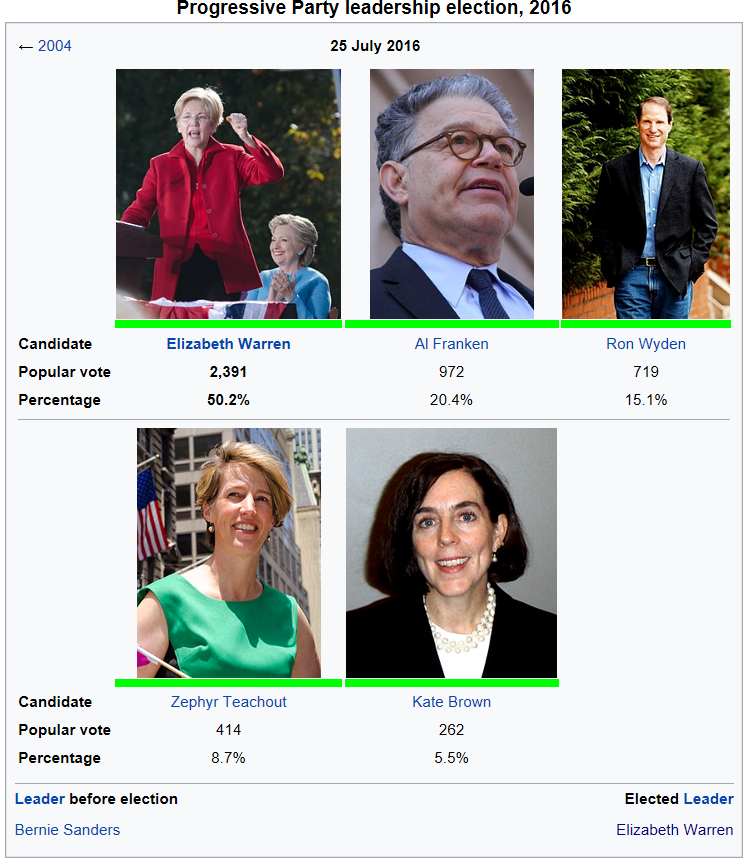
The general election would be quite bad for the Conservatives. Bush ran a terrible campaign with bad debate performances. Not only that, but the economy still wasn’t that good, and the war in Cuba was becoming quite unpopular. Bush defended it, while Warren won voters by promising to end it. It became a year of Constitution Party growth due to Conservative failures. Indiana, Wyoming, and Louisiana all went grey due to endorsements by former/current governors of the states, such as Dick Cheney in Wyoming. Despite losing a referendum, the Texas Independence Party was still popular in Texas and managed to improve its popular vote, insuring future Independence referendums in Texas and perhaps other states. The Liberal Party also had some trouble, due to the state of Ohio, which had gone Liberal since 2004, becoming more Conservative. This lead to the state going Conservative, despite the party’s loss. In the end, the Progressives prevailed and some began to worry for the future of the Liberal Party, as other traditional Liberal states, like Pennsylvania or New Hampshire were also becoming more conservative.
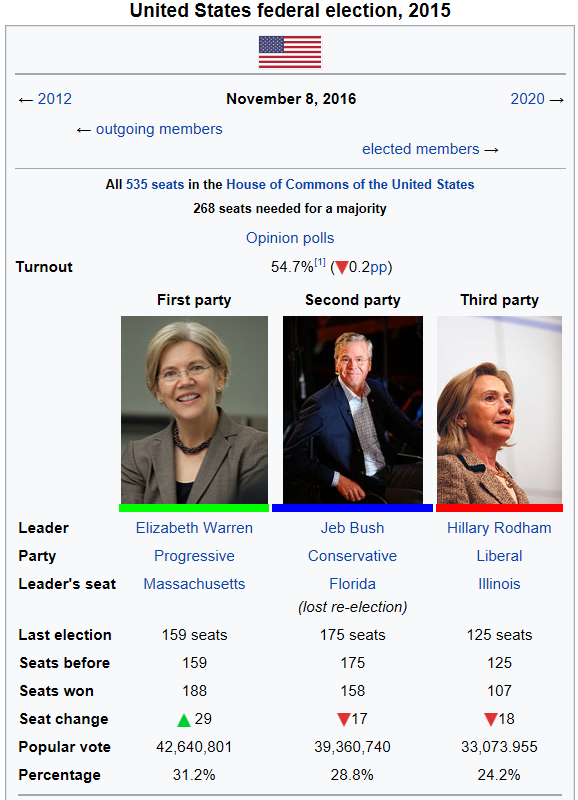
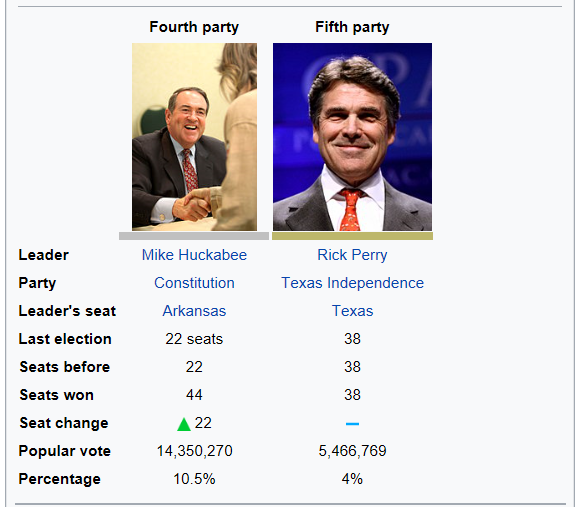
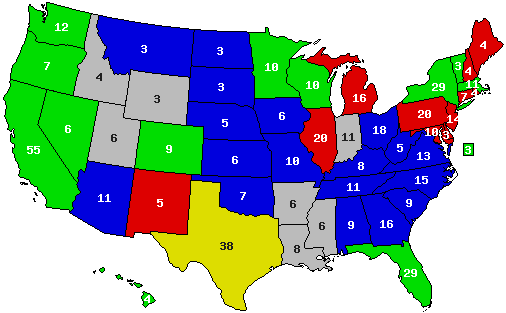
(Sorry about the 2015 at the top, I’ll try to be more careful next time, but I’m not completely redoing the wikibox to change one thing.)
Also, thanks to @gap80 for all the help!
A More Perfect Union
The leadership elections in America are quite like the conventions of pre-Parliament America. In it only a certain amount of delegates get to vote on people. While some have attacked it as being undemocratic it has been in place for decades and it is unlikely to end now. Two parties would hold leadership elections due to retirements. The Conservatives and the Progressives. Sanders and McCain had both been serving as party leader since 2004 and had both entered parliament in 1984, and both had been endorsed by their party's leaders at the time, Jerry Brown for Sanders, and Clint Eastwood for McCain. It was an end of an era.
The Conservative campaign would only have three candidates, which was surprising due to older leadership elections with more candidates. The three candidates were Jeb Bush, Jeff Sessions, and Rand Paul. Bush would gain the endorsement of McCain, helping him in polls. Not only that, but his opponents campaigns both had problems, while Bush ran a safer campaign. Sessions had problems since his campaign was trying to gain support from some members of the party that had left to join the the Constitution Party. While Sessions tried to appeal to the more populist wing of the party, he was failing to gain moderate voters, although a few did in protest of Bush’s boring campaign. Meanwhile, Paul had a different problem. While Libertarians had a place in the conservative party since Eastwood’s successful 12 years in office, Paul’s dad, Ron, ran a campaign that many declared radical against McCain in 2008. Paul was making things harder by running to preserve Eastwood’s America, the same campaign that Ron ran on in 2008. Paul picked up more votes than his father, but images of his father hurt his campaign.
Meanwhile, the Progressive Party was having its leadership election, with more candidates. The election would have five, Elizabeth Warren, Al Franken, Kate Brown, Zephyr Teachout, and Ron Wyden. Warren was seen as the successor to Sanders, although Sanders never endorsed her. Meanwhile, Franken, the former comedian ran a humorous, yet competitive campaign. Wyden ran off his long years of experience in parliament. However, Franken’s campaign wasn’t taken seriously by many and Wyden was seen as too “establishment” for many. Then there was Brown and Teachout. While both ran as populist Progressives, both had problems with their campaigns. Teachout was seen to have a lack of experience, while Brown’s sexuality became a problem, as many felt it would be hard to win with Brown as the leader. Not only that, but they split each other's vote as the populist Progressives. In the end it was the former attorney general and long time MP that took the win.
The general election would be quite bad for the Conservatives. Bush ran a terrible campaign with bad debate performances. Not only that, but the economy still wasn’t that good, and the war in Cuba was becoming quite unpopular. Bush defended it, while Warren won voters by promising to end it. It became a year of Constitution Party growth due to Conservative failures. Indiana, Wyoming, and Louisiana all went grey due to endorsements by former/current governors of the states, such as Dick Cheney in Wyoming. Despite losing a referendum, the Texas Independence Party was still popular in Texas and managed to improve its popular vote, insuring future Independence referendums in Texas and perhaps other states. The Liberal Party also had some trouble, due to the state of Ohio, which had gone Liberal since 2004, becoming more Conservative. This lead to the state going Conservative, despite the party’s loss. In the end, the Progressives prevailed and some began to worry for the future of the Liberal Party, as other traditional Liberal states, like Pennsylvania or New Hampshire were also becoming more conservative.
(Sorry about the 2015 at the top, I’ll try to be more careful next time, but I’m not completely redoing the wikibox to change one thing.)
Last edited:

